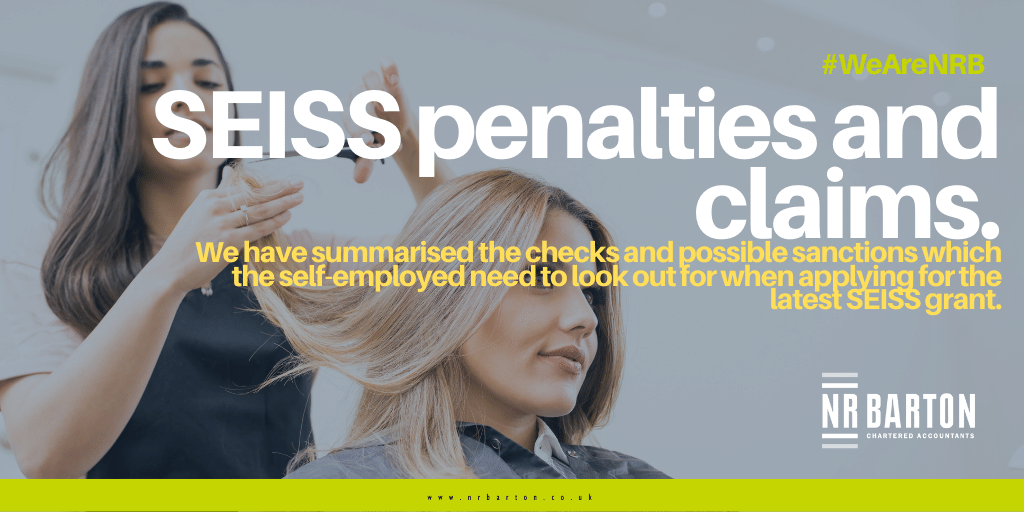As coronavirus support undergoes HMRC scrutiny, we summarise the checks and possible sanctions the self-employed need to look out for when applying for the latest self-employed income support scheme grant (SEISS).
The Treasury has provided HMRC with substantial resources to recover wrongly claimed coronavirus support payments, expecting to recoup over a third of grants made.
Proving SEISS was validly claimed
Entitlement conditions have evolved with SEISS varying the evidential boxes to be ticked.
| Conditions which must be met | SEISS 1 | SEISS 2 | SEISS 3 | SEISS 4 |
| The qualifying period | Up to 13 July 20 | From 14 July to 19 Oct 20 | 1 Nov 20 to 29 Jan 21 | 1 Feb to 30 April 21
|
| Intention to continue to trade in the tax year 2021/2022 (SEISS 4) and 2020/2021 (SEISS 1-3)
|
YES | YES | YES | YES |
| Business has been adversely affected by coronavirus
|
YES | YES | YES | YES |
| Reduced activity, capacity or demand or temporarily unable to trade in qualifying period, compared with what could reasonably have been expected but for the adverse effect of coronavirus
|
n/a | n/a | Sales reduced in qualifying period | Sales reduced in qualifying period |
| Reasonable belief that the business will suffer a significant reduction in trading profits in a basis period in which the qualifying period falls because of reduced activity, capacity or demand due to coronavirus. | n/a | n/a | Significant reduction in trading profits over at least one whole basis period | Significant reduction in trading profits over at least one whole basis period |
What is meant by… ?
Business adversely affected
This includes being unable to work because shielding, self-isolating, on sick leave or having care responsibilities because of coronavirus.
It also includes scaling down or temporarily stopping trading due to interrupted supply chains, fewer or no customers, staff unable to work or one or more contracts have been cancelled and the business tried to replace the lost work.
Isolation or caring responsibilities due to arrival in the UK are not valid adverse circumstances for SEISS, increasing the jeopardy of overseas travel this year.
Basis period in which the qualifying period falls
The qualifying period for SEISS 4 is 1 February to 30 April 2021 (and for SEISS 3 it was 1 November 2020 to 29 January 2021), but the basis period which must have a ‘significant reduction’ in trading profits depends what date accounts are made up to.
For many, the qualifying period may fall into two separate accounting years and, at the time of claiming, there must be a reasonable, honest belief that profits for at least one of those will suffer a significant reduction because of coronavirus. The significant reduction in profits must be for the basis period as a whole, not just the qualifying period, and it must be due to reduced sales – increased costs are not relevant for SEISS 3 and 4 claims.
Significant reduction
The Treasury and HMRC have declined to give any definition of “significant”, except to comment that it must be an honest assessment. It seems that a 30% reduction is definitely significant (based on the future SEISS 5 structure), but it may be argued that a smaller reduction is significant too, particularly if the claimant has no other source of income.
The percentage reduction is by comparison with what ‘would otherwise have reasonably been expected’, ie what profits were or could have been forecast to be if it were not for the pandemic.
Penalties and repayment of SEISS
HMRC has powers to assess overpaid SEISS even before 2020/21 tax returns are submitted, but otherwise SEISS wrongly claimed must be included on tax returns.
If a claimant didn’t know they were not entitled when the grant was received there will be no penalty, provided the grant has been repaid by 31 January 2022. At the other end of the scale, failure of a claimant to notify HMRC of a grant they knew they were not entitled to when received will be treated as deliberate and concealed for penalty purposes.
HMRC has a web page for anyone needing or choosing voluntarily to repay some or all of a SEISS claim.
Be prepared
Tax payers should collate adequate evidence at the time each claim is made showing the effect of the pandemic on trade, factors known at the time of the SEISS claim and a timeline of significant dates, including relevant school and childcare closures. We can assist with this if required.
If you have any questions about the content in this article please contact your usual Partner or Manager, or call us on 01942 242 245 and we will be happy to help.



